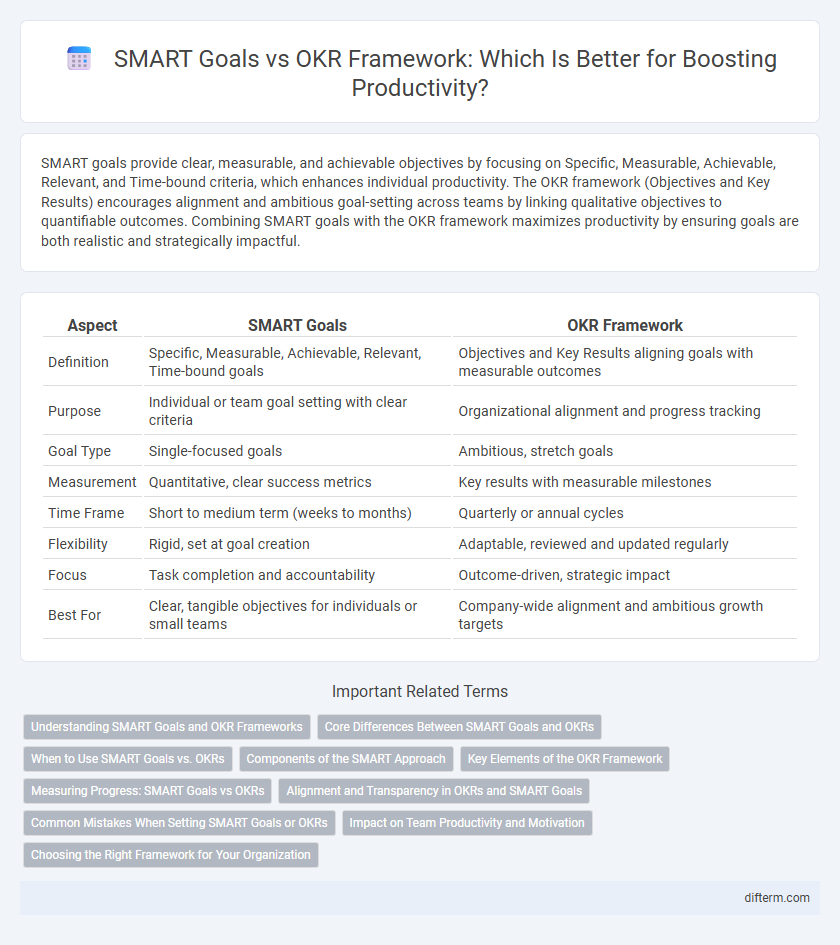SMART goals provide clear, measurable, and achievable objectives by focusing on Specific, Measurable, Achievable, Relevant, and Time-bound criteria, which enhances individual productivity. The OKR framework (Objectives and Key Results) encourages alignment and ambitious goal-setting across teams by linking qualitative objectives to quantifiable outcomes. Combining SMART goals with the OKR framework maximizes productivity by ensuring goals are both realistic and strategically impactful.
Table of Comparison
| Aspect | SMART Goals | OKR Framework |
|---|---|---|
| Definition | Specific, Measurable, Achievable, Relevant, Time-bound goals | Objectives and Key Results aligning goals with measurable outcomes |
| Purpose | Individual or team goal setting with clear criteria | Organizational alignment and progress tracking |
| Goal Type | Single-focused goals | Ambitious, stretch goals |
| Measurement | Quantitative, clear success metrics | Key results with measurable milestones |
| Time Frame | Short to medium term (weeks to months) | Quarterly or annual cycles |
| Flexibility | Rigid, set at goal creation | Adaptable, reviewed and updated regularly |
| Focus | Task completion and accountability | Outcome-driven, strategic impact |
| Best For | Clear, tangible objectives for individuals or small teams | Company-wide alignment and ambitious growth targets |
Understanding SMART Goals and OKR Frameworks
SMART goals provide a clear framework by defining Specific, Measurable, Achievable, Relevant, and Time-bound objectives that enhance individual productivity. OKR frameworks focus on setting Objective and Key Results to align team efforts and track measurable outcomes across an organization. Understanding both SMART goals and OKRs enables individuals and businesses to optimize performance and achieve strategic priorities effectively.
Core Differences Between SMART Goals and OKRs
SMART goals emphasize Specific, Measurable, Achievable, Relevant, and Time-bound criteria to create clear, actionable objectives aimed at individual or team performance improvement. OKRs (Objectives and Key Results) focus on setting ambitious objectives paired with measurable key results to drive alignment and stretch goals across organizations. The core difference lies in SMART's goal-setting precision for realistic targets versus OKRs' emphasis on transparency and aspirational outcomes to foster innovation and engagement.
When to Use SMART Goals vs. OKRs
SMART goals are ideal for individual task management and short-term projects, offering specific, measurable, achievable, relevant, and time-bound objectives to ensure clarity and focus. OKRs (Objectives and Key Results) are better suited for aligning team efforts with broader organizational priorities, promoting transparency and continuous progress tracking over longer periods. Use SMART goals when precise, actionable targets are needed, and implement OKRs for dynamic goal-setting that drives innovation and strategic alignment at scale.
Components of the SMART Approach
The SMART approach to productivity emphasizes Specific, Measurable, Achievable, Relevant, and Time-bound components to create clear and actionable goals. Each component ensures goals are well-defined and trackable, enhancing focus and accountability within teams. This framework contrasts with OKRs by focusing more on individual goal clarity rather than broad organizational alignment.
Key Elements of the OKR Framework
The OKR framework centers on setting Objectives that are ambitious and qualitative, paired with Key Results that are measurable, time-bound, and outcome-focused, ensuring clear progress tracking. Key elements include transparency across teams, alignment of individual goals with company-wide priorities, and regular check-ins to adapt and iterate on objectives. Unlike SMART goals, which are specific, measurable, achievable, relevant, and time-bound, OKRs emphasize stretch goals designed to drive innovation and continuous improvement.
Measuring Progress: SMART Goals vs OKRs
SMART goals provide clear criteria with specific, measurable, achievable, relevant, and time-bound targets that simplify tracking individual progress. OKRs focus on aligning measurable key results with ambitious objectives, encouraging continuous performance evaluation and organizational transparency. Both frameworks enhance productivity by offering structured methods to assess progress, but OKRs emphasize adaptability and collective achievement across teams.
Alignment and Transparency in OKRs and SMART Goals
OKR (Objectives and Key Results) framework emphasizes alignment across teams by clearly linking individual and organizational objectives, enhancing transparency through regular check-ins and public progress sharing. SMART goals focus on specific, measurable, achievable, relevant, and time-bound criteria that improve individual accountability but often lack the broad organizational alignment inherent in OKRs. The transparency in OKRs fosters collaboration and real-time adjustments, while SMART goals provide clear personal benchmarks for performance tracking.
Common Mistakes When Setting SMART Goals or OKRs
Common mistakes when setting SMART goals or OKRs include setting overly ambitious or vague targets that lack measurable outcomes, leading to unclear progress tracking. Ignoring regular review cycles results in goals becoming outdated, reducing alignment with organizational priorities. Failing to engage team members in the goal-setting process often causes low commitment and accountability, undermining overall productivity improvements.
Impact on Team Productivity and Motivation
SMART goals provide clear, specific, and measurable objectives that enhance individual accountability and focus, boosting team productivity through well-defined targets. OKR framework encourages ambitious, aligned, and transparent goals, fostering collaboration and intrinsic motivation by linking personal efforts to broader organizational outcomes. Combining SMART's precision with OKR's alignment drives sustained motivation and higher overall team performance.
Choosing the Right Framework for Your Organization
Choosing between SMART goals and the OKR framework depends on your organization's focus and scale; SMART goals emphasize specific, measurable objectives ideal for individual or team-level tasks, while OKRs align broader company vision with measurable key results, promoting transparency and agility. Companies prioritizing adaptability and continuous progress often benefit from OKRs' quarterly cycles and ambitious target setting, whereas organizations seeking clear, actionable tasks may prefer the precision of SMART goals. Evaluating your team's culture, growth stage, and strategic priorities ensures selecting the most effective productivity framework for sustained success.
SMART goals vs OKR framework Infographic

 difterm.com
difterm.com